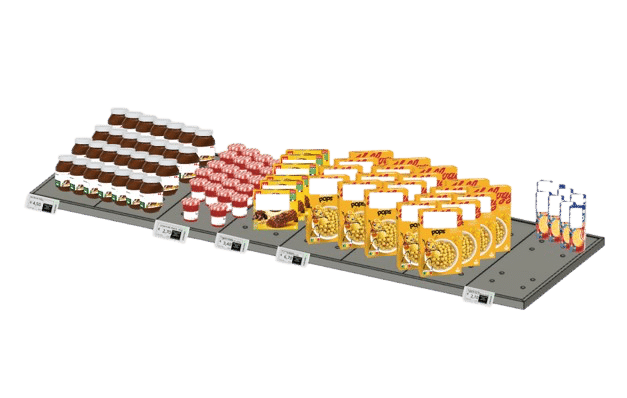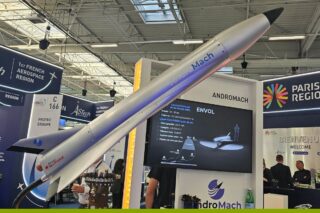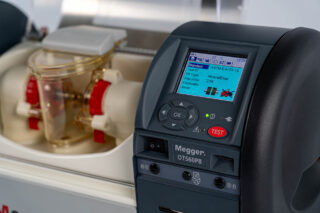Efficient stock management poses a significant challenge for players in the retail industry. Inadequate inventory management and poor anticipation of stock shortages can result in substantial financial losses. French startup Tekshelf has developed a technology that aims to make shelves smarter in order to optimize stock management. This solution not only addresses stock management but also helps combat food waste. Currently, the technology is being tested at a Carrefour store near Marseille, France.
Tekshelf, a contraction of “Tek” for technology and “Shelf” for shelves, is a French startup based in the south of France. Its mission is to make shelves in the retail industry smarter to enhance stock management.
Intelligent Shelves
Inefficient stock management can result in thousands of euros in lost revenue each year. Quentin Rey and Martin Lombardo, the co-founders of Tekshelf, noticed this during their professional experiences in vineyards and the retail industry.
Their company has developed 1.5 cm thick mats equipped with connected scales that can be directly installed on existing store shelves. These scales provide real-time updates on the availability of products such as canned goods and pasta and send alerts in case of stock shortages.
Quentin Rey explains further:
“We operate through weight measurements, so by knowing the unit weight of a product, we can accurately determine the number of available products on the shelf at any given time. This transparency of information enables us to alert store managers about stock shortages, thereby optimizing and facilitating stock management. Our solution does not require replacing or modifying the existing shelves; it can be easily plugged in. A one-meter by fifty-centimeter mat weighs around three kilograms.”

The process begins with store mapping and shelf planograms. Tekshelf scans all the product barcodes to obtain weight data and establish associations between weight and products for each shelf. Once the mat is installed, the weight information is converted into the number of products using an API. When a product is removed from the shelf, the information is transmitted in near real-time to the shelf managers via the Tekshelf application on their smartphones or tablets.
According to Martin Lombardo, this provides real-time visibility of stock levels.
“Previously, shelf managers had no real-time insight into the location of merchandise within the store. With our solution, we provide them with eyes on the sales floor. They know the exact number of products available on each shelf in real-time. This reduces the risk of stock shortages, optimizes reordering, and better meets customer demand.”
The solution aims to streamline stock management for store managers while improving profitability.
Tekshelf’s installation requires no specific prerequisites from clients, as the system can be adapted to existing shelves. However, an internet connection is necessary for communication between the connected scales and the web interface.
The startup has already conducted tests using Wi-Fi. However, the goal is to transition to high-frequency communication protocols such as Sigfox or LoRa, which are more reliable and energy-efficient.
Predictive Capabilities
Unlike some competitors, such as Believe.ai, who utilize vision systems, Tekshelf’s technology is deliberately low-tech. The emphasis is on simplicity and client understanding. Quentin explains that this choice was motivated by feedback from the retail industry stakeholders they worked with during the testing phase:
“The retail industry stakeholders we collaborated with during testing wanted a discreet, wirelessly connected device that could be easily used by their employees and was not overly complex.”
Although the hardware is low-tech, the core technology lies in the software. It leverages artificial intelligence and predictive algorithms that extend beyond simple stock management, as Quentin explains:
“The data provided by the system allows for analysis of product performance, prediction of future sales, and optimization of planograms based on seasonal trends. This data analysis aims to increase sales and reduce unnecessary stock.”
In other words, with AI, the Tekshelf solution can help anticipate sales trends and adjust planograms accordingly. For example, if a product is selling particularly well, it can be placed in a more strategic location on the shelf to increase its visibility. Speed and flexibility are key.
Tekshelf’s ultimate goal is to integrate the system with the stock management center to automate orders, explains Quentin:
“Today, section managers often have to manually scan stockouts in addition to the automatic ordering, which can lead to errors. For instance, there are often unknown brands that can completely distort the stock levels at any given moment in the store. Tekshelf complements this manual ordering with a more reliable automatic ordering system, allowing stock managers to receive restocking alerts and place orders more efficiently.”
Fighting Waste
In addition to optimizing stock management, Tekshelf aims to promote an eco-responsible approach to the retail industry, explains Martin:
“Guiding players in the retail sector towards a much more eco-responsible model is part of our guiding principle. In France, the retail industry is a major culprit when it comes to food waste. But we can provide them with the tools to improve.”
The Tekshelf system is capable of monitoring expiration dates and alerting stock managers to either perform rotations or promotional actions on products nearing their expiration dates to reduce food waste.
Furthermore, by optimizing product rotation and reducing dormant stocks, Tekshelf helps minimize financial losses associated with expired or unsold products.
The duo does not yet have specific data on the gains enabled by their solution. It is still being tested in a Carrefour store near Marseille, explains MartinQuentin:
“We are currently measuring these indicators and adapting the solution to fresh products because, for now, we have mainly focused on dry goods. However, it is with fresh products that the question of waste and expired unsold items is more prominent.”
The duo hopes to enter the industrialization phase and commercialize the solution by mid-2024. This will include hardware rental, software subscription, maintenance, customer support, and commercial assistance for the software, all facilitated through a financing organization.











